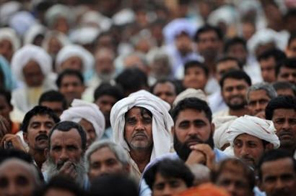Mayawati halts statue spree
NEW DELHI: India's Supreme Court has forced low-caste political icon Mayawati to halt her statue-construction spree aimed at celebrating the heroes on the lowest rung of the country's social ladder.
Mayawati, who leads the poverty-ridden northern state of Uttar Pradesh, has stirred huge controversy by spending hundreds of millions of dollars to build "statue parks" she says will boost the status of India's lowest castes.
The pugnacious politician initially defied the court's order last month to stop construction of Greek Parthenon-style memorials to political icons of the Dalits -- those at the bottom of the ancient Hindu caste hierarchy.
But after the court warned that the state government was "playing with fire" the 53-year-old, known as the "Dalit Queen", ordered a halt last Friday to building and the construction sites fell silent at the weekend.
The court order covers half a dozen sites being developed into memorials to leaders of the long-oppressed Dalits -- the 160 million Indians who still face widespread oppression despite legislation outlawing discrimination.
Many of the monuments are to Kanshi Ram, founder of Mayawati's Bahujan Samaj Party (BSP), B.R. Ambedkar who framed the Indian constitution and also of Mayawati -- whose statues show her carrying her trademark handbag.
The court censured Mayawati for spending an estimated 26 billion rupees (537 million dollars) on what critics have dubbed her "obsession" with building statues.
Uttar Pradesh is India's most populous state where funds are badly needed for hospitals, schools and other public services.
Mayawati, who has used her caste to mobilise voter support and become India's most important Dalit politician, has stirred opposition by changing land use rules, pouring concrete over green space and demolishing public buildings to create the memorials.
"Lifeless and insipid, they fail to move the spectator because they speak of nothing but their creator's lust for grandeur," wrote columnist Amrit Dhillon in the Times of India.
The top court said the state government could not "fritter away" public money on such memorials and promised to examine the "constitutional validity" of such memorials for political leaders using taxpayers' money.
But the former school teacher, who has proclaimed her desire to be India's first Dalit prime minister, has denied accusations that she is squandering public money.
She insists that the statues are meant to celebrate the contribution to India's history of the Dalits.
"We may look at them in terms of aesthetics and cost" but for many Dalits the statues are "symbols of empowerment", author Ajoy Bose, who wrote a biography of Mayawati, told AFP.
"They are a pilgrimage site for many Dalits," he says, but adds that if the Dalits believe Mayawati is not doing anything else for them "she will be in a lot of trouble".
Mayawati says nobody has criticised the ruling Congress party, led by Sonia Gandhi, for spending vast sums on monuments to the Nehru-Gandhi dynasty which has governed India for most of the period since independence in 1947.
Had the Congress party spent money on "memorials for eminent persons belonging to the Dalit community, the BSP government would not have felt the need for the task", she said recently.
Meanwhile, Uttar Pradesh opposition chief Mulayam Singh Yadav, ousted by Mayawati in 2007, has vowed to bulldoze the statues and memorials if he returns to power.
"If the Samajwadi Party is voted to power in the future, all statues and other constructions will be razed to ground," Yadav said last week.
"The SP will bring in laws whereby no government will be able to misuse funds for memorials and statues by obtaining the approval of the cabinet and the state legislature," he said.






